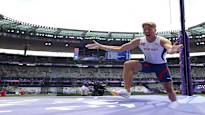When young Nordics are successful in global sports, one wonders how children get exercise differently in Norway than in Finland, writes Pekka Holopainen.
Pekka Holopainen sports reporter
21:00•Updated 21:03
Paris Olympics on channels 26.7.–11.8. Go to the competition website here. You can find the entire program of the games here.
PARIS. Even Norway, the great power of Olympic sports, began to suffer from the lack of medals, even though the country’s heavy athletics cannons Jakob Ingebrigtsen mixed Karsten Warholm are on fire in the week just starting.
Of course, there were positive expectations for the decathlon: there were Markus Rooth the youth European Championship gold medalist from Espoo last summer and a teammate Sander Skotheim EC runner-up from Rome less than two months ago.
The outcome is now known. Skotheim would have taken the Olympic gold straight up, if the guy suffering from jump scares had not destroyed his game in the pole position – in which Rooth, with a record improvement of 20 cents, grabbed the victory, which was not “suitable” for his compatriot.
It should have been guessed that when Norway opens its medal account, the sport will immediately be in such a noble class of Olympic status.
Rooth and Skotheim represent the Tjalve IK club from Oslo, whose home field is the legendary Bislett.
The name comes from Norwegian ancient traditions and means fast feet. Such can be found in the final event of the 10-match event, i.e. at 1,500 meters, above all from Skotheim. After losing his own game, he started as a rabbit in his teammate’s parade towards the second Olympic victory in the sport in the history of Norwegian athletics.
If the teammates had taken a double win, it would have been a repeat of 96 years ago. Tampere’s Pyrinnön snapped one at the Amsterdam Olympic Games SpongeBob Yrjölä and Achilles Järvinen.
Rooth’s bet of 8,796 points had such an effect on the reality of the sport in Finland that Eduard Hämäläinen 8,735 is now the former Nordic record.
Tjalve IK is the main organizer of the Oslo Bislett Games, one of the crown jewels of the Diamond League.
A slight peculiarity is that the club’s recent Olympic champion in athletics will not compete in them next summer either, when his own sport is of course not on the program of the one-night event.
Tjalve’s previous Olympic medalist was a shot putter Eivind Henriksen.
Match-based departure
In Norway, children’s athletics coaching in clubs often starts on a match basis. When the 22-year-old Rooth and Skotheim were 15 years old in 2017, it was proved to them that there is no harm in match-based training, even if the desire to focus on only one sport strikes later.
The witness and role model was one Karsten Warholm, the world champion in the youth 8-match event, who on August 9, 2017 ran at the World Championships in London on a fenced track circuit to win his first prestigious race at the age of 21.
When young Nordics succeed in global and brutal sports that require such training endurance, one naturally wonders how children can be exercised differently in Norwegian homes and clubs than in Finland.
My mother is also a top professional
The importance of genes in elite sports cannot be overstated. Markus Rooth’s coach father Espen Rooth was an all-around athlete-sledder and an extremely strong and resilient man.
Mum Mette Malm played handball as a top professional in the 1990s in the world’s number one club in Baekkelaget, which wouldn’t have been successful without being strong and resilient.
Now the father runs the sports research Idrettens Helsecenter facility in Oslo, funded by the Norwegian Football Association. From there, the boy gets all the hi-tech help he needs for training. The family is wealthy, which is never a disadvantage in pursuing the dreams of the offspring.
The previous 10-game winner in the Olympic Games was a Briton who – barely – was younger than Rooth Daley Thompson In Moscow 1980. At that time, the mailer was the alpha male of the British athletics coaches Steve Ovettwho defined Thompson’s athletic form this way: “Nine Mickey Mouse events and a snail’s pace 1,500 meters.”
Jakob Ingebrigtsen, who will try for Norway’s next track and field gold on Tuesday at 1,500 meters, hardly thinks about the brutal royal sport so low-mindedly, even though he has run the distance 63 seconds faster than Markus Rooth.
